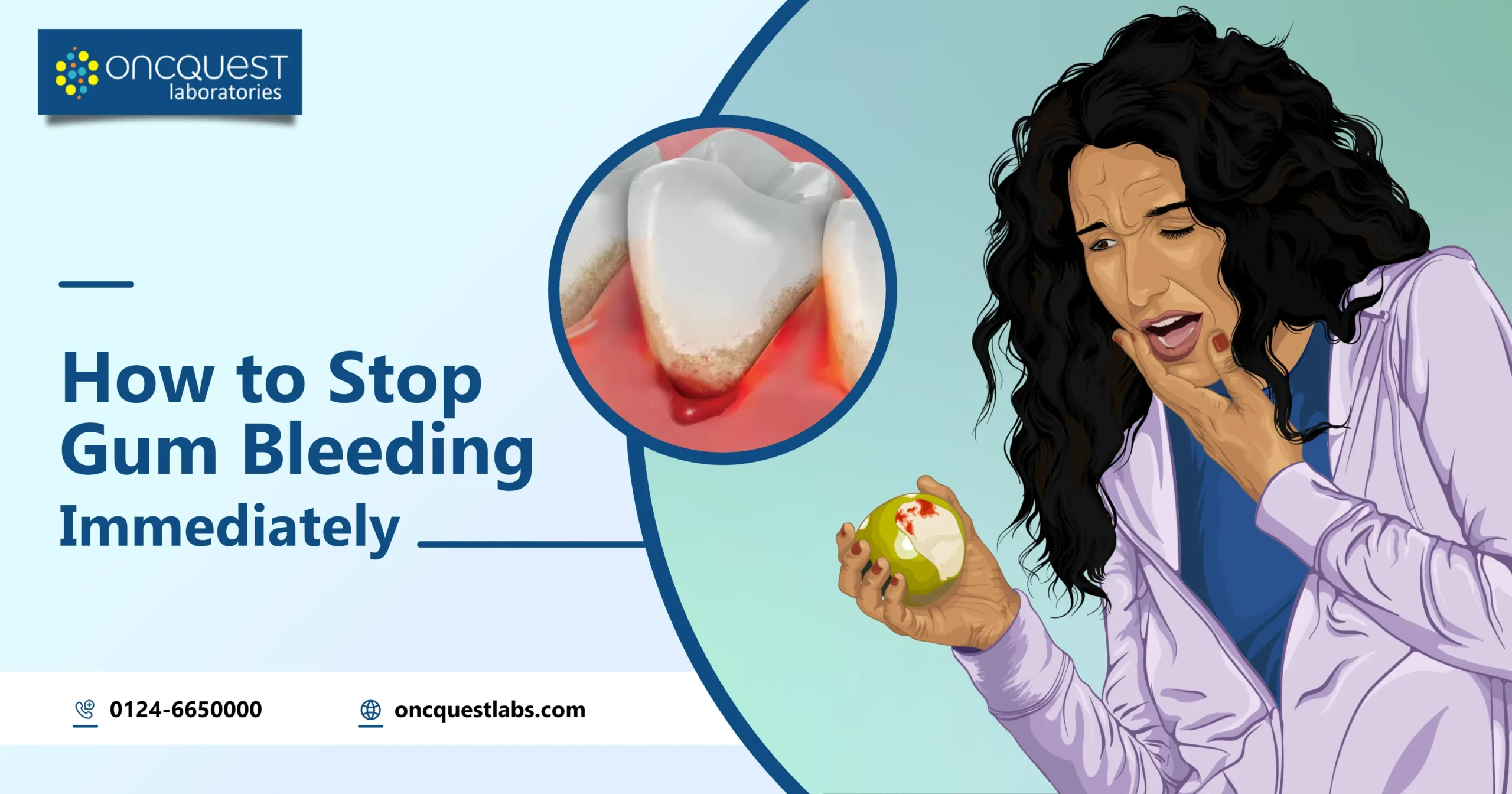Are you familiar with the discomfort of sudden gum bleeding? It can be quite alarming, but fear not – there are simple and effective ways to tackle this issue immediately. In this blog, we’ll explore practical steps and home remedies that can help you stop gum bleeding in its tracks. From easy-to-find household items to straightforward techniques, you’ll be equipped with the knowledge to address this common concern swiftly. Let’s dive into the world of quick fixes for gum bleeding and regain that confident smile!
Contents
- 1 Why is it Important to Keep Gum Healthy?
- 2 How do You Stop Gum Bleeding Suddenly?
- 3 Home Remedies to Stop Gum Bleeding Immediately
- 4 What is the Best Medicine for Bleeding Gums?
- 5 How do Dentists Treat Bleeding Gums?
- 6 Ensuring Lasting Gum Health: Strategies for Long-Term Treatment and Prevention
- 7 When to Schedule an Appointment with a Dentist
Why is it Important to Keep Gum Healthy?
Maintaining healthy gums is crucial for several reasons. Firstly, gums play a vital role in supporting and securing our teeth. Healthy gums help anchor teeth in place, preventing them from becoming loose or falling out. Additionally, gum health is closely linked to overall oral hygiene. Poor gum health can lead to conditions like gingivitis and periodontitis, which not only affect the mouth but may also contribute to systemic health issues.
Furthermore, healthy gums contribute to a pleasant and confident smile. They serve as a protective barrier, preventing harmful bacteria from entering the bloodstream and causing infections. Regular care and attention to gum health can help prevent issues, enhance oral hygiene, and contribute to overall well-being.
How do You Stop Gum Bleeding Suddenly?
To stop gum bleeding suddenly, try these steps:
1. Gentle Rinse: Rinse your mouth gently with warm saltwater. This helps cleanse the area and promotes healing.
2. Apply Pressure: Press a damp tea bag or a clean cloth against the bleeding gums. The tannins in tea can aid in clotting and reduce bleeding.
3. Cold Compress: Apply a cold compress to the outside of your cheek. This can help constrict blood vessels and reduce bleeding.
4. Avoid Irritants: Refrain from consuming hot, spicy, or acidic foods that can irritate the gums. Stick to a soft diet to minimize further irritation.
5. Maintain Oral Hygiene: Continue with regular, gentle brushing and flossing. Use a soft-bristled toothbrush to avoid further aggravating the gums.
If bleeding persists or is recurrent, it’s crucial to consult with a dentist for a thorough examination and appropriate treatment.
Home Remedies to Stop Gum Bleeding Immediately
Certainly! Here are some home remedies to help stop gum bleeding:
1. Saltwater Rinse: Gargle with a warm saltwater solution. This helps reduce inflammation and promotes healing.
2. Tea Bags: Place a damp tea bag (preferably black tea) on the bleeding gums. Tea contains tannins, which can aid in clotting.
3. Aloe Vera Gel: Apply a small amount of aloe vera gel to the affected area. Aloe vera has anti-inflammatory properties that may help soothe gums.
4. Cold Compress: Apply a cold compress to the outside of your cheek for 15 minutes. This can constrict blood vessels and reduce bleeding.
5. Vitamin C-Rich Foods: Incorporate foods rich in vitamin C (like oranges and strawberries) into your diet. Vitamin C promotes gum health.
6. Clove Oil: Dab a small amount of clove oil onto a cotton ball and apply it to the bleeding gums. Clove oil has natural antiseptic properties.
Remember, these remedies are supportive measures. If gum bleeding persists or worsens, it’s essential to consult with a dentist for a comprehensive assessment and appropriate treatment.
What is the Best Medicine for Bleeding Gums?
Over-the-counter antiseptic mouthwashes containing chlorhexidine or hydrogen peroxide can be helpful in managing bleeding gums by reducing bacteria and inflammation. Additionally, topical gels or ointments with ingredients like benzocaine or chlorhexidine may aid in relieving discomfort and promoting healing.
However, it’s crucial to note that these medications are supportive and temporary solutions. For persistent or severe bleeding gums, it’s recommended to consult with a dentist. They can identify the underlying cause and prescribe appropriate medications or recommend specific dental procedures tailored to your condition. Always follow the guidance of your healthcare provider for the most effective and personalized treatment.
How do Dentists Treat Bleeding Gums?
Dentists typically approach the treatment of bleeding gums by addressing the underlying cause and promoting overall gum health. Here are common steps they may take:
1. Professional Cleaning: Dentists perform a thorough dental cleaning to remove plaque and tartar buildup, especially along the gum line. This helps eliminate the irritants causing the bleeding.
2. Scaling and Root Planing: In cases of advanced gum disease, dentists may recommend scaling and root planing. This deep cleaning procedure removes plaque and calculus from below the gum line and smoothens the tooth roots to promote healing.
3. Oral Hygiene Education: Dentists provide guidance on proper oral hygiene practices, including effective brushing and flossing techniques. They may recommend specific oral care products tailored to your needs.
4. Prescription Medications: In some cases, dentists may prescribe antimicrobial mouthwashes, antibiotics, or other medications to control infection and inflammation.
5. Lifestyle and Dietary Recommendations: Dentists may offer advice on lifestyle changes and dietary adjustments to support overall oral health and reduce factors contributing to gum bleeding.
6. Regular Follow-Up: Follow-up appointments are essential to monitor progress and make any necessary adjustments to the treatment plan.
It’s crucial to consult with a dentist for a comprehensive evaluation and personalized treatment plan based on the specific cause of your gum bleeding. Regular dental check-ups and proactive oral care are key to maintaining healthy gums in the long run.
Ensuring Lasting Gum Health: Strategies for Long-Term Treatment and Prevention
1. Regular Dental Check-ups: Schedule routine dental visits for professional assessments and early detection of any gum issues.
2. Professional Cleanings: Undergo regular dental cleanings to remove plaque and tartar buildup, preventing gum inflammation and disease.
3. Effective Oral Hygiene Routine: Brush teeth twice a day using fluoride toothpaste and a soft-bristled brush. Floss daily to remove plaque and debris between teeth.
4. Lifestyle Choices: Avoid tobacco use, as it contributes to gum disease. Maintain a balanced diet rich in nutrients, particularly vitamin C, which supports gum health.
5. Address Underlying Issues: Treat any dental problems promptly, such as cavities or misaligned teeth, to prevent complications affecting the gums.
6. Antimicrobial Mouthwash: Consider using an antimicrobial or fluoride mouthwash as recommended by your dentist to enhance oral hygiene.
7. Stay Hydrated: Drinking water helps flush away bacteria and debris, contributing to a cleaner oral environment.
8. Manage Stress: Chronic stress can impact oral health. Practice stress management techniques to reduce its potential effects on your gums.
9. Regular Gum Examinations: Be mindful of any changes in your gums, such as swelling, bleeding, or sensitivity, and seek professional advice promptly.
10. Customized Oral Care: Work with your dentist to create a personalized oral care plan, considering your specific needs and any existing oral health conditions.
Consistency in these practices, combined with professional guidance, is key to the long-term treatment and prevention of gum issues.
When to Schedule an Appointment with a Dentist
1. Regular Check-ups: Schedule routine dental check-ups every six months for preventive care. These appointments allow dentists to detect potential issues early on.
2. Persistent Pain or Discomfort: If you experience persistent toothaches, gum pain, or discomfort, it’s crucial to consult a dentist. These symptoms could indicate underlying problems that need attention.
3. Bleeding Gums: If your gums bleed during brushing or flossing, it may be a sign of gum disease. Consulting a dentist can help identify the cause and initiate appropriate treatment.
4. Swollen or Inflamed Gums: Swelling or inflammation of the gums can be indicative of various oral health issues, including infections. Prompt dental evaluation is essential.
5. Tooth Sensitivity: Heightened sensitivity to hot or cold substances may suggest dental issues like cavities or exposed nerves, requiring professional assessment.
6. Changes in Tooth Color or Shape: Any noticeable changes in the color or shape of your teeth should be examined by a dentist, as they could signal dental problems.
7. Persistent Bad Breath: Chronic bad breath may be linked to dental issues or underlying health concerns. A dentist can identify the cause and recommend appropriate solutions.
8. Jaw Pain or Clicking: If you experience jaw pain, clicking sounds, or difficulty chewing, it’s advisable to consult a dentist for an examination, as these could be signs of temporomandibular joint (TMJ) issues.
9. Loose or Shifting Teeth: Any changes in the alignment or stability of your teeth should be addressed promptly. It could be indicative of gum disease or other dental conditions.
10. Dental Trauma: If you suffer an injury to the mouth, teeth, or jaw, seeking immediate dental attention is crucial to assess and address any damage.
Remember, regular dental visits are not only for addressing problems but also for preventive care. Maintaining a proactive approach to oral health contributes to long-term well-being. If in doubt, it’s always best to consult with a dentist for professional advice.
Conclusion
In conclusion, prioritizing regular dental check-ups and promptly addressing any oral concerns are pivotal for sustained oral health. Routine visits empower early detection of potential issues, allowing for timely intervention. Whether managing discomfort, addressing gum bleeding, or maintaining a preventive mindset, collaboration with a dentist ensures personalized care. Consistent oral hygiene practices, lifestyle choices, and immediate attention to any anomalies contribute to a confident and healthy smile. Remember, proactive dental care is an investment in long-term well-being, fostering not only oral health but overall quality of life.





